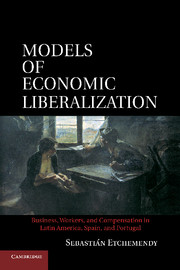 Models of Economic Liberalization
Models of Economic Liberalization 10 - Conclusions
Legacies for the Liberalized Economies and Varieties of Capitalism in the Developing World
Published online by Cambridge University Press: 07 October 2011
Summary
Introduction
The macroeconomics of effective stabilization and market adjustment evolved in a roughly similar way in all the cases analyzed in this study. All involved thorough financial and trade liberalization, monetary restraint and alternative ways to anchor the exchange rate to cope with inflationary pressures (e.g., modes of fixed parity to the dollar in Chile, Argentina, Mexico, and Brazil and integration into the European Monetary System in the cases of Spain and Portugal). Exchange-rate-based stabilization generally led to currency overvaluation and therefore to rising adjustment costs for the industrial sector.
Yet this book has shown that the modes of making economic liberalization politically viable, the patterns of compensation delivered, and the type of actors in business and the working class that benefited from them were remarkably different. In Argentina’s and Portugal’s Corporatist adjustment, important industrial business groups and national unions were rewarded with market-share compensation – that is, state assets and partial deregulation in the context of more or less formal concertational policymaking. In the Spanish and Brazilian Statist models, top-down restructuring plans in strategic sectors and a system of subsidies were used to placate industrial firms and unions. In Chile’s and Peru’s Market path, the state sidelined traditional ISI insiders, leaving industrial and sectoral readjustments largely in the hands of market forces. At the same time, the neoliberal governments targeted the unemployed and the atomized poor in the informal sector, or ISI outsiders, in a manner unrivaled in the Statist and Corporatist models. Finally, in the Mixed model of Mexico analyzed in , neoliberal authorities, unlike in the three models just depicted, did not concentrate compensation exclusively on ISI insiders or outsiders, but on a combination of both. Market-share deals with certain business groups and unions were parallel to a massive search for political support among the informal poor through the targeted social program PRONASOL.
- Type
- Chapter
- Information
- Models of Economic LiberalizationBusiness, Workers, and Compensation in Latin America, Spain, and Portugal, pp. 300 - 316Publisher: Cambridge University PressPrint publication year: 2011


